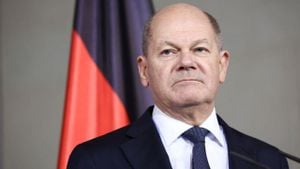Kash Patel was confirmed as the ninth FBI Director on February 21, 2025, during a ceremony held at the Eisenhower Executive Office Building. His appointment is notable, making him the first Indian American and Hindu American to lead the agency.
Patel's confirmation, which came after fierce debate and scrutiny over his qualifications, has sparked substantial interest from both supporters and critics. While Democrats have labeled Patel the "worst choice", President Donald Trump voiced his staunch support, stating, "One of the reasons I love Kash and wanted to put him in is because of the respect the agents had for him. He will go down as the best ever at this position."
At the swearing-in ceremony, Patel was accompanied by his girlfriend, country singer Alexis Wilkins, who held the Bhagavad Gita. Wilkins, who has gained attention for her conservative views and advocacy for veterans, expressed her pride on social media, saying, "Looks like the USA is going to be okay. Proud is an understatement."
Before his confirmation, Kash Patel garnered attention for his previous roles within the Trump administration, including serving as the Chief of Staff to the acting Secretary of Defense. His rise within the political ranks was also fueled by his key role on the Republican-led House Intelligence Committee, where he contributed to the production of the controversial memo critiquing the FBI's investigation of Russian interference.
Many have expressed concern over Patel's management experience relative to predecessors, particularly due to his statements characterizing FBI officials as "criminal gangsters". During his confirmation hearing, when quizzed about these statements, Patel remarked, "I have no interest, no desire and will not, if confirmed, go backwards," asserting his commitment to preventing the politicization of the Bureau going forward.
Shortly after taking office, Patel has already initiated considerable changes at the FBI aimed at refocusing the agency's efforts on traditional crime-fighting methodologies. Reports indicate he intends to relocate about 1,000 employees from Washington, D.C. to field offices across the nation, alongside advancing the preparation of 500 employees for transfer to new facilities, including one based in Huntsville, Alabama.
Patel’s early directives were encapsulated by the FBI's public statement, emphasizing, "Director Patel has made clear his promise to the American public... focused on combatting violent crime," underlining the department's renewed commitment to local safety and coordination with community initiatives.
This shift seems to resonate with sentiments from constituents frustrated with perceived FBI overreach and politicization. Critics of Patel worry, though, about how his past remarks will influence his actions. Senator Doug Jones (D-AL) noted, "This confirmation shows the power of loyalty over experience. The FBI needs stability, not divisiveness."
Patel’s approach is being closely monitored, as both sides of the political aisle weigh in on his leadership style and decision-making. At the same time, the newfound public interest has also extended to Wilkins, who is actively involved with veteran-focused organizations and has produced content emphasizing conservative values.
The couple recently took to social media to give supporters a glimpse of their unity, posting images from their time with Trump, marking another step for Patel's newly found visibility and Wilkins's rising star. Her involvement has naturally fueled discussions about how public figures manage the balance between personal and political realms.
For many Americans, Patel’s tenure as FBI Director is loaded with expectations; supporters hope for reforms they believe are overdue, whereas detractors remain skeptical of his ability to effectively lead the agency without compromising its integrity. Upcoming months are likely to shed light on Patel's effectiveness, as he begins to implement his agenda and reiterates the promise of placing the FBI back on course.
Overall, Kash Patel's ascension to FBI leadership not only marks a significant development within the Bureau but also reflects broader shifts within American politics, encapsulated by the intertwined paths of his personal and professional life. With both Patel and Wilkins under the public eye, their actions will likely shape not only the future of the FBI but also influence public perceptions of the agency as it moves toward renewed focus and reform.



